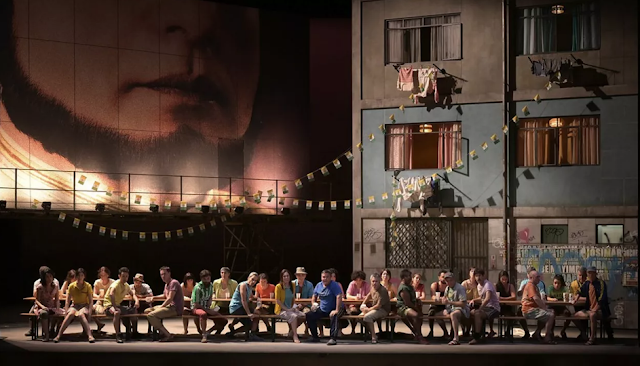Offenbach - La Périchole
Théâtre des Champs Elysées, Paris, Tuesday November 15 2022
Conductor: Marc Minkowski. Production and Costumes: Laurent Pelly. New dialogues: Agathe Mélinand. Sets: Chantal Thomas. Lighting: Michel Le Borgne. La Périchole: Antoinette Dennefeld. Piquillo: Stanislas de Barbeyrac. Don Andrès de Ribeira: Laurent Naouri. Le Comte Miguel de Panatellas: Rodolphe Briand. Don Pedro de Hinoyosa: Lionel Lhote. Guadalena/Manuelita: Chloé Briot. Berginella/Ninetta: Alix Le Saux. Mastrilla/Brambilla: Eléonore Pancrazi. Frasquinella: Natalie Pérez. Le vieux prisonnier/Le Marquis de Tarapote: Eddy Letexier. Le premier notaire: Mitesh Khatri. Le deuxième notaire: Jean-Philippe Fourcade. Les Musiciens du Louvre. Chorus of the Bordeaux Opera.
 |
| All photos: Vincent Pontet / TCE |
Many people must have been as pleased as I was to see Marc Minkowski and Laurent Pelly were scheduled to pair up again, after twenty years or more (eek!), for La Périchole. Pelly is no more infallibly brilliant than any other director, and Minkowski may not be the most delicate of conductors, but some of my fondest operatic memories are of Offenbach collaborations of theirs: La Belle Hélène and La Grande Duchesse de Gérolstein, both with Dame Felicity Lott and Yann Beuron (not to mention Rameau's Platée, revived this year at the Palais Garnier).
La Périchole is full of hit numbers, but the plot is thinner and less engaging than that of Hélène or La Grande Duchesse. While Pelly's staging may not be his best ever, it is highly effective: youthful, lively and energetic - never a dull moment; and his imagination and ideas help flesh out the action, give it some cohesion and keep it from flagging.
There are (for once) four sets.
The first shows a space in front of a 50s or 60s working-class tenement, with bunting, benches and trestle tables. Over it looms a giant photo of the viceroy/dictator, so big we see only the lower half. The (paid) revellers are dressed lightly, in colourful clothes suitable for a hot country, and the three girls serve their 'mejor riquiqui de la ciudad' from a dinky little food truck wheeled on and off as needed. Périchole wears denim cut-offs, tatty fishnets and a leather jacket, Piquillo camouflage cargos and a vest. Some of the humour, as usual with Pelly and Minkowski, goes on between the stage and the pit: in Platée, La Folie keeps the conductor waiting while she spins out her cadenzas, or takes over the conducting herself; here, La Périchole is so 'grise' that, with a flick or two of the hand from the bench she's sliding off, she delays the start of the second verse, leaving the orchestra to tick over until she's ready.
The second set suggests a Second-Empire saloon, (albeit a dark one) with deep, black, button-back sofas under giant mirrors in elaborate, gilded frames, and still the viceroy's looming face in the shadows. The ladies of the court are played as preening Barbie-cum-Kardashian reality-show bimbos in ballooning silver crinolines, fingering, twisting and tossing back their long, blond hair as they jeer at Piquillo, now in a dinner suit, and sneer at La Périchole, now in a slinky fuchsia satin fourreau with matching stilettos.
The third is the prison, now surveyed by the dictator's giant eyes from behind the mesh fencing, and the fourth is a sweeping night-time vista of the city (modern Lima, I guess) and its lights, forming a backdrop to the billboard - by this stage tattered and tagged with graffiti.
The action throughout is detailed, including chorus movements and choreography, mostly fast-paced, and the lighting excellently managed.
We were originally to have, in the title role, Marianne Crebassa, but she withdrew, as Christian Merlin gallantly put it in Le Figaro, 'pour la plus belle des raisons', so our Périchole was Antoinette Dennefeld. She certainly has both vocal and physical glamour - not only did she know how to walk in those high heels, she could run in them when the production called for it, fourreau or not - but was sometimes overpowered by her partner, Stanislas de Barbeyrac, who still has a tendency to sing loud most of the time (and is starting to sound stiff at the top); yet just as I was thinking, if only he would vary his dynamics more, he proved he could if he wanted, in a more subtly modulated 'On me proposait d'être infâme.'
Laurent Naouri is a veteran of some of those original Pelly/Minkowski Offenbach productions, twenty-odd years ago. His diction is still excellent, his voice carries well in the theatre and he remains an excellent comic actor. If he now tends to bark a bit, in this blustering kind of part that isn't a problem. Rodolphe Briand and Lionel Lhote carried off their secondary roles with panache, and if the three girls in the food truck were less striking to hear, they were at any rate fun to watch.
The Bordeaux chorus plunged into the action with enthusiasm, but sometimes seemed to go a little bit awry, musically speaking. This may have been to do with Minkowski's tempi: he more or less thrashed at the score regardless, undeniably keeping things moving forward at a cracking pace, but at the risk of leaving his singers behind, or at any rate unable to articulate clearly. The supertitles were often useful.
Still, it was a good evening's entertainment, certainly more convincing than the Opéra Comique's Périchole just last season, and thanks to the near-frenzied conducting (you can get an idea of it from the clip below), we were out in good time for dinner.
Having read Bachtrack's lively, colourful review of this production, I'm painfully aware how flat my write-up is in comparison. So for more fizz, here's a link to Bachtrack.






Comments
Post a Comment